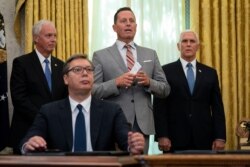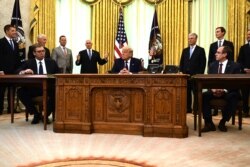Russian Foreign Ministry spokeswoman Maria Zakharova has apologized for a Facebook post in which she compared the photo of Serbian President Aleksandar Vucic at a meeting with U.S. President Donald Trump to a scene from the iconic thriller “Basic Instinct.”
Zakharova, however, did not miss the chance to hit at the United States.
“UPD (update) I apologize, but my post was misinterpreted! The only thing that was held in it was the rejection of arrogant attitude from the ‘exceptional.’”
“Protocol tricks have become one of the techniques that American officials regularly go to artificially create the visibility of their own exclusivity. And this is unacceptable.”
Zakharova seemed to disparage Vucic in an earlier comment on the Facebook post, saying he was invited to the White House to be interrogated.
“If you were invited to the WH (White House), and the chair was put as if you were in questioning, sit down as in photo #2 Whoever you are. Just believe me.”
Her comment infuriated Vucic and other Serbian officials.
“The primitivism and vulgarity she showed speaks about herself, but also about those who have given her the job,'' Vucic told Pink TV, a pro-government station.
He also said that during his visit last week in Washington he defended Serbia's close ties with Moscow, including his opposition to Western sanctions against Moscow over Ukraine and an arms’ purchase from Russia.
Marko Djuric, an official with Vucic's ruling party, took on Twitter to defend Vucic.
“This president did not say a single bad word against Russia, not even in that place (the White House.) ... I will not allow you to attack proud Serbia. Shame on you!”
А замисли тај председник ниједну ружну реч против Русије није рекао, чак ни на том месту. А замисли тај председник је код руског председника и по сат и по времена чекао на пријем и никада није тражио посебну столицу. Ја Вам не дозвољавам да нападате поносну Србију. Срам Вас било! pic.twitter.com/yCdQDhxWIF
— Марко Ђурић (@markodjuric) September 5, 2020
The Serbian president's office said Sunday that Zakharova’s boss, Russian Foreign Minister Sergey Lavrov, spoke with Vucic, stressing the “sincerely close ties” between the two countries.
While seeking membership in the European Union, Serbia under President Vucic has been building close political, economic and military ties with Russia and China.
Vucic was in Washington last week to sign a U.S.-brokered agreement with Kosovo’s Prime Minister Avdullah Hoti to normalize economic relations between the two countries.
Vucic and Hoti commended the agreement as a significant step forward.
Trump who also signed the document at the White House ceremony Friday (September 4), called the agreement “historic," saying that “after a violent and tragic history and years of failed negotiations, my administration proposed a new way of bridging the divide.”
At the heart of the dispute between the former foes, is Serbia’s refusal to recognize Kosovo’s independence, declared unilaterally in 2008.
Most Western nations, including the United States, have recognized Kosovo. Russia and China have not.







